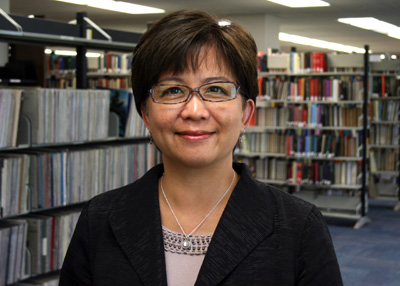Composed of a diverse array of faculty, staff and administrators, the Oakland University community is unique, creative, and dedicated. As part of a continuing effort to explore the various roles and lives of our Golden Grizzlies, the News @ OU website presents a new interview series. We invite you to share these stories and “Take 5” with OU.
“Take 5 with Adriene Lim”
Adriene Lim is the dean of University Libraries. She joined the Oakland University community just last August, and has been working on planning and preparing for the implementation of several major, strategic initiatives that will take place over the next two years. Adriene earned her doctorate from Simmons College this spring, completing her dissertation on the topic of unionization and leadership in academic libraries. She is a Detroit native, and was the first member of her family to attend college, earning both her bachelor’s and master’s degrees at Wayne State University. Before joining Oakland, Adriene most recently served as interim university librarian at Portland State University in Oregon. Happy to return to Michigan, Adriene lives in Royal Oak with her partner Mary, and their Australian cattle dog, Zoe Balboa.
1) What made you decide to go into Library and Information Science?
I grew up in a rough neighborhood in Detroit, but it had a public library branch where I spent most of my free time. It was a wonderful refuge and a safe place from the adversity in my neighborhood. The experience made me value libraries and librarians, and I wanted to be like them. I think many librarians and library workers have made a positive difference in people’s lives. Reading expands people’s minds and lets them see beyond what is in front of them and imagine what can be. This definitely applies to academic libraries as well, where librarians help people find and use information, and where scholarly content is shared and helps people create new knowledge.
2) What changes have you made since joining the Oakland and Kresge Library community?
Higher education is facing many challenges now, and my role has been to help the Libraries focus intensely on supporting the university’s educational priorities, increasing our capacity to do new things, and providing the services, instruction, and resources that have the most impact on library users. For example, I think it is important to evaluate our existing service models to see if they are working effectively or if they could be changed for the better.
3) What are some of your favorite books?
I love so many types of books! I love the classics from the Romanticism period quite a lot. Charles Dickens is an all-time favorite, but I also love mysteries and dime store detective books like Nero Wolfe by Rex Stout. I read a lot of nonfiction and get into popular books about physics and economics. Now that I’ve completed my doctorate, I’ll have more time to read for fun and to conduct my own research, and I also want to start writing slam poetry. I attended my first slam at Oakland and I loved it.
4) Where is your favorite vacation spot?
I love being able to take easy road trips to nearby cities. In the Detroit area, we are surrounded by interesting cities like Windsor, Toronto and Chicago. I think Canada is a hidden treasure and offers so many interesting places to visit. Mary and I are planning to visit friends in Edmonton soon, and we love Ottawa.
5) Why is it important for an academic library to evolve along with trends and technology?
We must evolve as our users’ needs and demands change, in order to be as effective as possible. Digital technology has transformed society, academia, and libraries, and it’s our job to leverage technology to enhance research, teaching, and learning as much as possible. In the library, we have developed seamless interfaces, useful guides for how to navigate through massive amounts of information, and have created exciting learning environments that integrate information resources, technology, and instruction. At the same time, there is still a lot of scholarly content that is not electronic, and we are able to continue providing that as well. As higher education changes, we want to be a leader in information literacy instruction and take advantage of emerging technologies, and continue to be responsive to our users’ changing needs.

